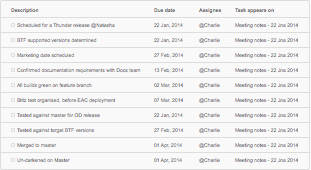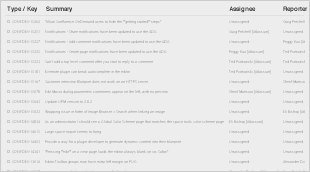The LSST Data Management System Science Team (SST) supports the DM Subsystem Scientist (as the overall Product Owner) in ensuring that Data Management Organization's initiatives provide solutions that meet the overall LSST scientific goals. Members of the SST work together to define, maintain, and communicate to the DM construction team a coherent vision of the LSST DM system responsive to the overall LSST Project goals. The SST also devises and undertakes initiatives to scientifically validate the DMS implementation.
SST membership comprises:
SST Ex-Officio
The primary roles of Institutional Science Leads are to serve as the Product Owners for parts of the system their respective institutions have been tasked to deliver. The System Science Analysts (Staff) generally lead and/or execute studies needed to support SST work. The DM Science Validation Scientist organizes and coordinates the Science Validation efforts (data challenges, other test exercises). The Science Pipelines and Platform Scientists serve as the architects of those two elements of the system, and broadly advise on topics related to the impact of science pipelines/platform on delivered science and vice versa. These roles are defined in the DM Organization Document (LDM-294). SST ex-officio members
Please see the DM-Community Communications page.
This is the SST Confluence page. It's only accessible to logged in Confluence users (i.e., restricted to lsst-confluence-users group). The short link to this page is http://ls.st/sst.
DM SST business is generally conducted via the dm-sst@lists.lsst.org mailing list.
Any JIRA issue (typically RFCs, DMs, and LITs) of interest to the SST can be labeled with the 'dm-sst' label. Within the Data Management project on JIRA, issues that are the responsibility of DM Science Team should be assigned to the 'DM Science' team. The union of the two can be viewed using Issues tracked by the DM System Science Team filter in JIRA, or on the associated Kanban board.
DM SST Slack channel is #dm-sst; however, it's use is discouraged for anything other than messages not meant to be permanent (i.e., passing a link to someone, or communicating in real-time during meetings). There is no expectation that any of the SST members should follow or read (catch up) with the discussion on #dm-sst.
The SST as a whole meets every week, via BlueJeans video (https://bluejeans.com/103664856, 10:00am PT, every Friday, with the first meeting being on 24 March 2017). SST Meetings are chaired by the DM Subsystem Scientist. Meeting minutes are posted on the DM Science Team meeting minutes page, and short-term (to be done until the next meeting) actions recorded as Confluence tasks (see http://ls.st/jnv for your personal list of open tasks). The meetings are not closed, but they are intended as working meetings of the team to which others will be specifically invited as relevant topics arise on the team's agenda. The LSST Project Scientist will frequently attend the meetings of the SST.
Subteams within the SST (e.g., the, Science Validation Team, or SST Staff Meetings) may have additional meetings and gather on a different cadence.
DM SST work (e.g., data for studies, document sources) should go to repositories in https://github.com/lsst-dmsst, unless a more appropriate place exists for it.
Final results (written-up study reports) should be issued as DM Technical Notes (DMTNs) whenever appropriate. To facilitate the issuing of DMTNs, study reports should be kept in a repository separate from the repository with study data or code (e.g., DMTN repositories need to be kept in the lsst-dm github organization). The reference to the repository with study materials should be incorporated into the technical note via the git submodule mechanism.
All reports need to be added to Collection-5401 in Docushare, unless they've been published as DMTNs. If they were published as DMTNs, a Docushare URL object should be added to point to the relevant DMTN. Per project policy, documents should be added to Docushare by e-mailing them to Robert McKercher (the LSST Project Librarian). Docushare group “DM System Science Team" also exists to grant/restrict access to DM-SST documents, as needed.
Presentations given in SST roles need to be uploaded to a sub-collection in Collection-107. Per project policy, have them added by e-mailing Robert McKercher (the LSST Project Librarian). For presentations in meetings with significant DM presence, upload to a sub-collection with the name of the meeting (or ask one to be created). For one-off presentations (e.g., on telecons to project bodies, or Science Collaborations), use Collection-5712 ("DMSST Presentations").
SST-driven studies published as papers are generally subject to the rules of the LSST Publication Policy. When publishing, co-authorship and comments from LSST Builders (see Section 5 of the Publication Policy) need to be solicited.

